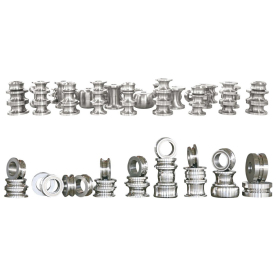[Heat-Resistant HSS Blade]Unlocking Durability and Precision: The Advantages of Heat-Resistant HSS Blade in Modern Tooling Applications
News 2024-10-16
In the ever-evolving world of industrial tools and manufacturing processes, the demand for precision and durability is paramount. Among the various cutting tools available, Heat-Resistant High-Speed Steel (HSS) Blades have emerged as a standout option for professionals across multiple industries. This article will explore the unique properties of heat-resistant HSS blades, their applications, advantages, and why they are becoming a go-to solution for those seeking reliability in their cutting operations.
What is Heat-Resistant HSS?
High-Speed Steel is a specialized alloy designed to withstand high temperatures caused by friction during metal cutting. It is primarily composed of iron, carbon, and alloying elements such as tungsten, molybdenum, and chromium. The introduction of heat-resistant properties enhances its ability to perform efficiently at elevated temperatures, making it suitable for intensive cutting tasks where other materials might fail.

Unlocking Durability and Precision: The Advantages of Heat-Resistant HSS Blade in Modern Tooling Applications
Heat generation during metal cutting is a significant concern for tool longevity. Traditional cutting tools often lose their temper and structural integrity when exposed to extreme heat, leading to reduced performance and a shorter lifespan. Heat-resistant HSS blades are engineered to maintain hardness and wear resistance even at temperatures exceeding 600°C (1112°F). This thermal stability allows for faster cutting speeds and productivity improvements without compromising the tool's effectiveness.
Advantages of Heat-Resistant HSS Blades

Unlocking Durability and Precision: The Advantages of Heat-Resistant HSS Blade in Modern Tooling Applications
2. **High Cutting Speeds**: With their ability to maintain cutting performance at high temperatures, heat-resistant HSS blades can operate at higher cutting speeds. This enables manufacturers to boost their productivity and efficiency, significantly reducing cycle times in machining operations.
3. **Versatility**: Heat-resistant HSS blades have a broad range of applications. They can be used for various cutting tasks, including drilling, milling, and turning of different materials such as steel, aluminum, and even harder alloys. This versatility makes them an indispensable component in manufacturing and machining environments.
4. **Precision and Accuracy**: The design of heat-resistant HSS blades allows for extreme precision in cutting operations. Their ability to maintain sharpness even after prolonged usage ensures clean cuts and accurate detailing, which is essential for industries such as aerospace, automotive, and electronics.
5. **Resistant to Shock and Impact**: Besides thermal stability, heat-resistant HSS blades also possess excellent toughness. They can withstand shocks and impacts during operations, reducing the chances of chipping or breaking, which further enhances their reliability in demanding environments.
Applications in Various Industries
Heat-resistant HSS blades find applications across different sectors due to their remarkable properties. In the automotive industry, they are used for machining engine components, where precision and durability are crucial. In aerospace manufacturing, heat-resistant HSS blades are employed to machine parts that must endure high stresses while maintaining strict tolerances.

Unlocking Durability and Precision: The Advantages of Heat-Resistant HSS Blade in Modern Tooling Applications
Conclusion
In conclusion, the introduction of heat-resistant HSS blades has revolutionized the tooling landscape, providing professionals with a reliable, high-performance solution for their cutting needs. With superior durability, high cutting speeds, precision, and a wide array of applications, these blades deliver significant advantages that enhance productivity and efficiency.
As industries continue to advance and demand higher standards of performance, heat-resistant HSS blades will undoubtedly play a pivotal role in shaping the future of manufacturing and machining. For businesses looking to optimize their operations and achieve unbeatable results, investing in heat-resistant HSS blades could very well be the key to success in today’s competitive market.
